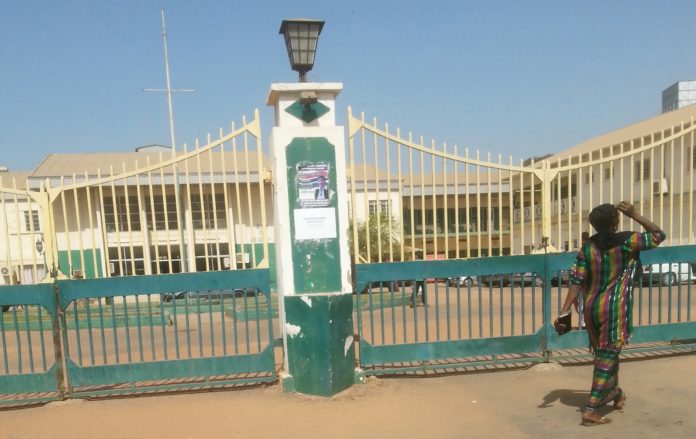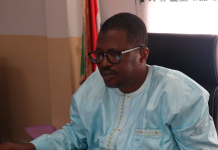As she ran out of cash while fighting for son’s life
By Mustapha Jallow
Aja Fatou Mboge, 72-year-old mother, is calling for urgent intervention at the Edward Francis Small Teaching Hospital (EFSTH) in Banjul, as he ran out of money while fighting for her admitted 34-year-old son’s life.
Mboge said since her son’s admission, she spent close to twenty thousand dalasis (D20,000) on medicines, tests, food and water at the said hospital.
On a daily basis, she will spend D600, D1000 or D2000 on medicines and tests at a private laboratory outside the hospital.
“I have nothing left because I spent everything on medicines and tests. I am no longer working. I also pay rent and have other children at home that need my care too. Everything is expensive. The hospital does not have what we need. Sometimes, doctors or nurses will refer us to a private lab or pharmaceutical,’’ he remarked.
Her son, Abdoulie Gaye, is bedridden for three weeks now at Minor Theatre ward of the hospital, after suffering from liver cyst that needs to be operated on. But due to lack of enough materials, the operation could not take place, according to Mboge.
She said Gambia is the only country, where its citizens will suffer in hospitals due shortage of medicines, testing materials and other facilities, saying even beds for their patients they are paying for it (D100 per week).
Mboge further listed the medicines that are not available and they will buy outside the hospital are: Metronidazole injection IP, Paracetamol infusion IP, Diclofenac sodium IP, Ranitidine hydrochloride injection IP, Saline cells and cannulas. He added that hand gloves would sometimes be a problem too.
She explained that both doctors and nurses are trying their best to put a smile on the face of their patients, but she said they are not getting enough support to ensure the patients receive the better treatment they deserve.
“Many tests or scanning you have to do outside the hospital building too, where you will pay a lot of cash. Each time they will tell you that it’s not available in the hospital,’’ she said. “The wards are mostly left unkept during weekends and lack of water is sometimes a problem due to lack of maintenance, spoilt taps, unkept restroom and there is also shortage of plasters for nurses, when using a cannula or dressing patients, they have to buy in a nutshell from wards. Patients’ wellbeing isn’t in the best conditions due to shortage of supplies.’
Mboge would take loans from colleagues or neirbours to be able to do the tests and buy drugs for her beloved son. She said the latest test they did outside the hospital cost them D810. She called on Gambians to help her admitted son, while urging the government through the health ministry to take a leading role in addressing the problems occurring at public hospitals to allow citizens to get access to free medications and receive better treatments.
“We thought our lives would be saved here but sadly, we are not seeing much here as we expected. We also buy everything that our patients need by ourselves, not talking about the daily transportation, food and water’’ she said. “We called on the health minister to address these problems at the hospitals across the country. I and other patients are suffering a lot. We really need help. If not, we will end up losing our admitted patients and we really do not want to lose them,’’ Mboge said.
Also speaking to Momarr Faye, an admitted patient at EFSTH, said he had spent two weeks at the hospital and his daily expenditure is making his life difficult, saying in a day, he will spend D500, D600 or D1000.
“I spent two weeks and what I also spent here on medicines and food is too much every time I receive a prescribed note letter for medicines. This is very serious and painful, and every patient is in pain about the issue,’’ the bedridden patient, Faye said.
“Every day, we spent an amount of D900 or D1000 on medicines and testing. If you are not financially strong, your life will be difficult for you. My brother is the one admitted, we also spent one month here,’’ a brother to another patient said.
Kebba Samuel Nyanchor Sanneh, EFSTH spokesman said: “The issue is patients are complaining, and I must tell you that they will complain. EFSTH responsibility is not to be buying gloves, and we are not equally buying the medicines. What I am trying to say separately is that the government is responsible or the ministry is responsible for buying the drugs and these drugs are kept at the Kotu medical store.’’
“We get these medicines on request from our pharmacies. So, what is available at the Kotu store is what is brought to us. We are doing our best with the little available to us. What is available is what we give our patient but when the drug is not available, we refer them to the pharmacy,’’ he said.
Asked what needs to be done to address the patients’ concern, EFSTH spokesman said: “You know, I don’t want to advise the government what they should do. I think this is a small community and we all know what should be done in terms of medical drugs.’’
He further called on the patients to have and excise patience.



















